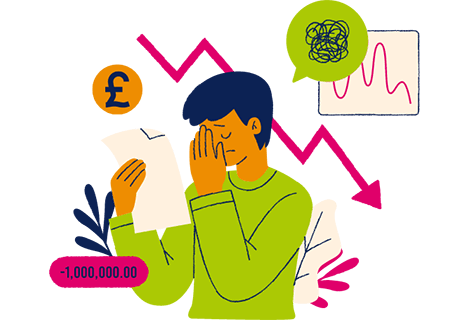
Understanding CCJs and mortgages: What you need to know
Getting a mortgage with a CCJ, or County Court Judgment, may be difficult. However, being well informed and having a good understanding of CCJs will help you navigate the process.
What is a CCJ?
A CCJ is a type of court order, which is issued when you owe money to a creditor and you have failed to pay it back. Creditors use these to get the money they have lent back.
If you receive a CCJ, it is recorded on your credit record and will stay there for 6 years. Lenders will be able to see this, which means it may make it harder to get finance in the future.
How do CCJs affect your ability to get a mortgage?
When you apply for a mortgage, your lender will run a credit check to understand more about your financial background. Having a CCJ on your record will signal to lenders that you have struggled to make repayments in the past and therefore could mean you are a higher risk borrower. This means they may be less likely to accept you for a loan.
If you are approved, you may find that interest rates are higher or that you get a smaller loan than you wanted.

Can I get a mortgage with a CCJ?
It is possible to get a mortgage with a County Court Judgement on your credit record. However, it may be more challenging.
Nevertheless, there are some lenders who specialise in working with clients who have a history of bad credit. So, there might be a lender who is willing to work with you.
CCJ mortgage lenders might be harder to identify, so you might consider using a broker to help you. By working with a CCJ mortgage broker, you can get a good idea of the lenders who might be willing to help you, and the type of terms they might be able to offer. However, using a broker may mean there are extra fees involved, than if you went directly to a lender.
Our experts are skilled in helping customers with complex circumstances, so if you are struggling to get accepted for a mortgage, we may be able to help you.
How to improve your chances of getting a mortgage with a CCJ
There are steps you can take to try and improve your chances of getting approved for a mortgage.
- Check your credit report
The first thing you should do when applying for a mortgage with a CCJ is get familiar with your credit report. You should check all of the information is accurate. There could potentially be errors that may be making it more difficult for you to get approved. If this is the case, you should get in touch with a credit reference agency, to get them to correct any errors. This may help improve your credit score and make you a more attractive borrower to lenders.
- Pay off the money you owe
If you have an outstanding CCJ, it can help to pay off the balance you owe. This shows lenders that you are taking steps to improve your financial situation. Once a CCJ has been paid, it is marked as satisfied on your credit report.
- Wait it out
The impact of the CCJ will gradually reduce over time, making you become less of a risk to lenders. So if you can wait until it is less recent, it may improve your chances of getting approved.
- Save a large deposit
Saving a large deposit can help offset some of the risk of lending to you. This may also help you get a better mortgage rate. This is because lenders view borrowers with a large deposit as less risky. This could increase your chances of being accepted for a mortgage.
- Work with a mortgage broker
Working with a specialist mortgage broker could be a good way of improving your chances of being approved. They will likely have access to a wider range of lenders, so they may be able to help you identify one that will accept your application. They can also provide additional guidance through the application process. However, using a broker may mean you have to pay extra fees than if you went directly to a lender.
If you're having financial problems, it's a good idea to reach out to your current creditors for help. They may be able to offer support or arrange alternative repayment plans. For extra support, you could also contact MoneyHelper or Citizens Advice Bureau (CAB) who offer free advice.
Managing your finances after a CCJ
Getting a CCJ can have a big impact and may prevent you from getting loans in the future. Taking steps to better manage your finances can therefore help you avoid further problems.

Firstly, after receiving a CCJ, you should consider setting up a budget. This means you can track your income and expenses, to ensure you are living within your means. You could use an app or a spreadsheet to track your finances and identify where you could cut back.

Your CCJ will likely have a repayment plan to help you pay it off. However, if you have any other debts from personal loans or credit cards, you should focus on paying them as soon as possible too.

In addition, you may find that you could benefit from speaking to a financial advisor or debt charity if you are struggling to manage your finances. They may be able to help you create a plan to manage your finances and build your credit score over time.

How to apply for a mortgage with a CCJ
Applying for a mortgage can be achieved either online or by phone.
Make an enquiry – Call us or enquire through our online form above. You will have to answer some questions about your circumstances, so we can understand your situation.
Leave it to us – We will search our database to find the best solution we have available for your circumstances.
Decision time – We will get in touch with a solution if we can find one that is suitable. Then it is up to you if you want to proceed. If you do, we will help you through the rest of the process.
Before you proceed, it’s important you make sure you can comfortably afford the repayments. Otherwise, if you default on your loan your home could be repossessed.
Get Started
Call us for FREE or enquire using the form above.
Don't forget – making an enquiry will not affect your credit rating in any way!





